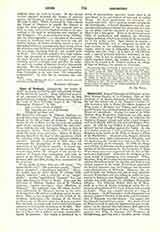

Siger of Brabant, indisputably the leader of Latin Averroism during the sixth and seventh decades of the thirteenth century. Many influential masters of art espoused his principles, and Pierre du Bois praised his oral teachings; finally Dante immortalized his name in these flattering verses of the “Divina Commedia: Paradiso”, X, 136:
Essa é la lute eterna di Sigieri
Che, leggendo nel vico degli strami,
Sillogizzd invidiosi veri.
His illustrious colleague, St. Thomas Aquinas, expressly refuted his teachings. There are few authentic details of the life of Siger of Brabant. He was a master of arts at Paris, and for ten years the guiding spirit of the agitations that troubled the university. From 1266 he was with the legate, Simon de Brie, in disciplinary affairs. From 1272 to 1275 he held in check the rector of the university, Alberic of Reims, placing himself at the head of the opposition, which he recruited from the Garlande Quarter (scholares golardie). Though condemned in 1270 Siger still continued the propagation of his ideas, and his opposition to his Scholastic masters. A second condemnation, in 1277, put an end to his teaching. He was brought before the tribunal of the Grand Inquisitor of France, was condemned, and took an appeal to the Roman Court. He died at Orvieto, between 1281 and 1284, having been assassinated by his secretary.
Of the works of Siger there are still extant: “De anima intellectiva”, “De ternitate mundi”, “Quiestiones naturales”, “Quaestiones logicales”, “Quiestio utrum haec sit vera: Homo est animal, nullo homine existente”, and a collection of six “Impossibilia”. Another unpublished “Quaestio” has just been discovered by Pelzer of Rome. Siger was the adversary of Albertus Magnus and of St. Thomas Aquinas, “contra prsecipuos viros Albertum et Thomam”. His principal work (De anima intellectiva) called forth St. Thomas’s treatise on the unity of the intellect (De unitate intellectus contra Averroistas). Siger in fact supported all the beliefs of the Averroist philosophy,—the. monism of the human intellect; one intellectual spirit for all men, separate from the body, is temporarily united with each human organism to accomplish the process of thought. Man is mortal, but the race is immortal. Hence the question of a future life is without meaning; immortality cannot be personal. The world is produced by a series of intermediary agencies; hence there is no providence in the government of men and of earthly things. All these productions are necessary, co-eternal with God. All is ruled by cosmic and psychical determinism. Celestial phenomena and the conjunction of the planets control the succession of events on our globe, and the destinies of the human race. Man is not a free agent. There is an eternal reversibility of civilizations and religions, the Christian religion included, which is governed by the reversibility of the stellar cycles. Siger wished to remain a professing Catholic, and to safeguard his faith he had recourse to the celebrated theory of the two truths: what is true in philosophy may be false in religion, and vice versa. It is hard to tell whether such a mental attitude indicates buffoonery or sincerity. One is lost in conjecture as to the motive which impelled Dante, the admirer of Thomism, to place in the mouth of St. Thomas Aquinas the eulogy of Siger of Brabant, the apostle of Averroism.
M. DE WULF

